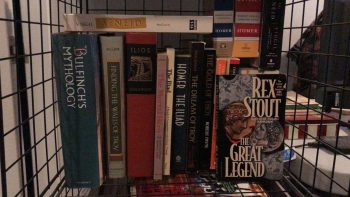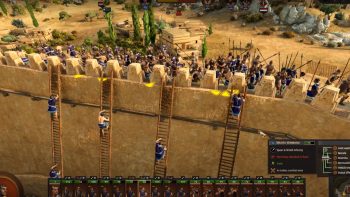Beware of Greeks Bearing Gifts (and giant wooden horses. I mean, seriously!)
 The story of Troy has been my favorite myth since I was a little kid. Greek mythology is far and away my favorite (Norse is a distant second), and I used to check Bullfinch’s out of my grade school library and lug it home. That was a relatively big book. I have my own copy now, of course.
The story of Troy has been my favorite myth since I was a little kid. Greek mythology is far and away my favorite (Norse is a distant second), and I used to check Bullfinch’s out of my grade school library and lug it home. That was a relatively big book. I have my own copy now, of course.
The worst part, is I always root for the Trojans. It never ends well for them. If they had just listened to Laocoon. Though, Athena definitely made that a dangerous proposition…
I’ve used a couple names from Thieves World over the years, in various online RPGs. But hands down, the Iliad has been my main source. Hector, and some variation of Astyanax (I prefer it with more ‘N’ or ‘X’, has far and away my favorite names for fighters (especially paladins). I’ve used a few others, like Penthesilia, Cassandra, and Deiphobus (Helenus just doesn’t work for me).
Way back in pre-Windows days (I think), there was a really cool computer game that included a Troy section. I think you were Jason with his Argonauts, roaming the world. Age of Empires II (man, I played the heck out of that) included a Troy campaign (except I had to sack Troy. Sniff, sniff). There’s a Total War: Troy (kind of a scaled down TW game) that I don’t have yet. You might have read over the past couple weeks that I’m a huge Total War: Warhammer I/II fan.
I don’t do the Assassin’s Creed series, butt there was an Odyssey game, recently. The Odyssey is essentially a sequel to The Iliad. As is Virgil’s The Aeneid.
I read a few translations over the years. But the only version I do now is Robert Fagles’ audiobook. Which, unfortunately, is abridged. I always try to get unabridged versions of books. But for some reason, they never did an unabridged for Fagles’ Iliad. Curiously, The Odyssey and The Aeneid audiobooks are unabridged, so that’s good.
I talked about it here, and Derek Jacobi is absolutely FANTASTIC. Probably the best-read audiobook I’ve ever listened to. They had Ian McKellen do Fagles’ Odyssey, and Simon Callow read The Aeneid (Callow is number two, with McKellan still good, but third). Jacobi is nothing short of brilliant.
As I’ve talked about here at Black Gate before, audiobooks let me get to things I otherwise would not read. Old, and new. About once a year, I listen to The Iliad CDs in my car, during the work commute. Some years, I follow it up with The Odyssey. I don’t do The Aeneid that often, but I have listened to it more than once.
The Iliad and The Odyssey are believed to be written not very long apart; both in Greek. As with some of Paul’s Epistles, some think Homer did not author both. I’m just gonna go with ‘Yes, he did.’ The Aeneid as written some six centuries later, in Latin.
 Highly recommend Fagles’ translation, with Jacobi’s reading. I have him doing some Sherlock Holmes and it’s okay. But he slays The Iliad.
Highly recommend Fagles’ translation, with Jacobi’s reading. I have him doing some Sherlock Holmes and it’s okay. But he slays The Iliad.
The Iliad ends with Hector’s funeral games. Homer recounts some of the events after – including that frigging horse – in The Odyssey.
There were other poems by other poets, about The Trojan War. For example, Arctinus of Miletus wrote the five-book Aethiopis. It started right after The Iliad ended, with the arrival of the the Amazon Queen, Penthesileia
There are six additional poems, but sadly, they’re lost. About thirty lines of Lesches of Pyrrha’s Little Iliad is the largest surviving excerpt of these lost Ilios stories. Along with The Iliad and The Odyssey, they make up The Epic (or Trojan) Cycle. Click here for a short look at the lost poems.
I bought Heinrich Schliemann’s Ilios decades ago. It is not exactly light reading. The Mortal Hero is a nice intro to The Iliad, and I recommend that for somebody wanting to dig into it, without actually reading the epic. Though I think should read Homer.
The Brad Pitt movie, Troy, was a big-budget telling of the story. It took out all the mythology. Maybe that made sense from an on-screen perspective, but I was disappointed. It’s an okay movie. I waited a long time for somebody to make Troy, and to make 42 (the Jackie Robinson story). I much prefer the latter.
I tried to sit through the 2018 mini-series, Troy: Fall of A City. What an unwatchable load of garbage.
On my ever-growing ‘To Write About’ list here at Black Gate, is Rex Stout’s The Great Legend. Stout, of course, created Nero Wolfe, who I have written about extensively here at Black Gate. He took the gods out of the picture, and told an alternate story. I like it.
Stephen Fry has written three apparently ‘different’ books on Greek mythology, with book three on Troy. I’m not interested, and haven’t checked them out.
I’m listening to Barry Strauss’ 2007 book, The Trojan War: A New History. The reader’s voice doesn’t do much for me so it’s gonna be a slow almost 9 hours, but it’s interesting enough, an hour in.
An idea I’ve had,which I won’t commit the time and effort to, is a daily FB series. I would post amusing (to me) daily updates from some embedded poet/journalist:
“And we’ve landed on a rather nice beach. I imagine we’ll wrap this up in a week or two and head back home.”
Or maybe a foot soldier in the Greek ranks:
“Man, Achilles was in a foul mood this morning. That guy needs to lighten up.”
So, this has just been some rambling on something I’ve been interested in for most of my life.
UPDATE – The week this post went live, I discovered an unabridged version of Fagles’ audiobook is coming out in June. The run time will be 20 hours – the abridged is 8 hours. I am intrigued, but it doesn’t say who narrates.

Bob Byrne’s ‘A (Black) Gat in the Hand’ made its Black Gate debut in 2018 and has returned every summer since.
His ‘The Public Life of Sherlock Holmes’ column ran every Monday morning at Black Gate from March, 2014 through March, 2017. And he irregularly posts on Rex Stout’s gargantuan detective in ‘Nero Wolfe’s Brownstone.’ He is a member of the Praed Street Irregulars, founded www.SolarPons.com (the only website dedicated to the ‘Sherlock Holmes of Praed Street’).
He organized Black Gate’s award-nominated ‘Discovering Robert E. Howard’ series, as well as the award-winning ‘Hither Came Conan’ series. Which is now part of THE Definitive guide to Conan. He also organized 2023’s ‘Talking Tolkien.’
He has contributed stories to The MX Book of New Sherlock Holmes Stories — Parts III, IV, V, VI, XXI, and XXXIII.
He has written introductions for Steeger Books, and appeared in several magazines, including Black Mask, Sherlock Holmes Mystery Magazine, The Strand Magazine, and Sherlock Magazine.
The new-ish Emily Wilson translation of the odyssey is outstanding, and gives a different perspective to the story.
I was fascinated with the story of Troy and Greek Mythology as a kid. I think that is natural for a boy (and probably some girl too.) I don’t know if kids today read much mythology.
I suspect with the prevalence of fantasy fiction, not a lot of mythology being read. And don’t know where it’s being taught much anymore.
Maybe the Marvel movies got some people to check out Thor in the Norse mythos. Wouldn’t bet on it, though.
Being in the book business I can attest that there’s been a bit of a resurgence of interest in mythology. It’s driven in part by the exploding fantasy market, which is comprised primarily of younger folks these days. It’s also getting a big boost from the growing genre of mythical revisionist novels that have been big with the BookTok crowd for the past half-decade or so.
I have Fagles’ transations of both the Odyssey and Iliad on my shelves, and found them quite readable. Though the Odyssey is oddly structured: The first half seems to be mostly a science fiction novel about visiting strange new islands and meeting new people and new monsters, but the second half is something of a blend of spy thriller and revenge narrative, with a dash of caper.
The Odyssey definitely feels like a different story from The Iliad. I’m with you there.
Whenever I revisit The Odyssey, I picture Armand Assante, from the miniseries.
I see they are making a new one, with Tom Holland (Spider Man) in the lead. Huh.
If I remember rightly, there was an Odyssey movie in the 50’s with Kirk Douglas as Ulysses. (Titled Ulysses, naturally.) If Kirk could be Spartacus, why not?
Ah. I see it was an Italian production. I can see Kirk doing a fair Ulysses back then. I like Anthony Quinn, too.
It’s been years since I’ve seen it, but my memory is “it’s fine”
I thought he was excellent in it. And I loved Troy…minus the accents. I thought the casting was spot on.
Hi, Bob. I strongly recommend Claire North’s Penelope Trilogy about what was going on in Ithaca during the Iliad and Odyssey. Hera, Aphrodite, and Athena each narrate a novel. Lots of other gods and legends (Helen of Troy, Menelaus, etc.) appear, as well as a batch of characters created by the author.
Thanks for another great article Bob. I’ve always loved mythology and was blessed to take a Myths & Legends class as an English elective in high school and a Mythology class in college (one of the fun classes I took each semester to balance the engineering classes). Read the Odyssey, Iliad, and the Aeneid in the college course. I remember enjoying the Aeneid the most. As far as favorite myth “series”, does King Arthur and the quest for the grail count? If so, that would be mine. If not, I would say the 12 trials of Heracles. And as for movies, you can’t beat “Jason and the Argonauts”.
Oh yeah – King Arthur counts. I had Malory’s Morte de Arthur once. I love the Grail myths.
Tom Holland! No way!!
Of current actors I’d suggest Tom Hardy would be right for the part.
I wonder if the old-time game with the Troy section was The Return of Heracles (Atari 8-bit computers, Commodore 64, and Apple II). It had a Troy section, an Argonauts section, and a whole lot of others.
Ha. That game reminded me of TEmple of Apshai, which was one of my earliest PC games.
No, it wasn’t that one., The graphics were much better.
Titan Quest is steeped in Greek Mythology, with characters giving speeches about it. I reinstall and play it every few years. Replaced Diablo as my favorite point and click.
Temple of Apshai was the very first computer game I ever played (on a TRS 80). We’d sit in my friend’s shop taking turns playing the game and listening to Eldorado by ELO (and the stereo was hooked up to an oscilliscope).
I started with the Greek myths, complements of Hamilton and Bullfinch, but when I found the D’Aulaire’s Book of Norse Myths, it was like all bets were off. I still appreciate the Greek stories, though I like Henry Treece’s “realistic” retelling of them even more. I reviewed his book Jason over at the old Tales from the Magician’s Skull site
https://goodman-games.com/tftms/2023/05/08/a-look-at-henry-treeces-jason/
I used to map out the Temple rooms on grid paper. I also had Upper Reaches of Apshai. I played them on my Atari 1200 XL.
A little later, I played Gateway to Apshai on a cartridge. It was more ‘modern,’ but a blast.
Apshai is my very gaming roots.